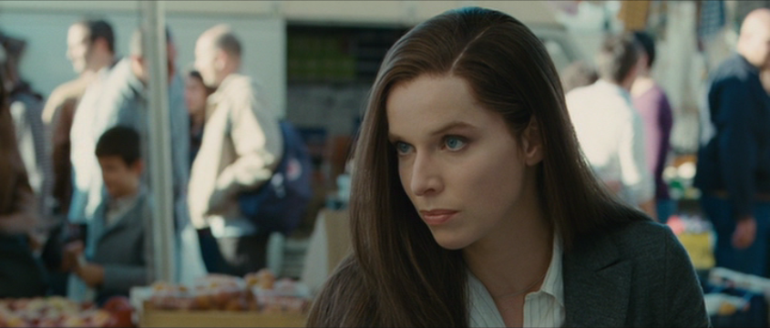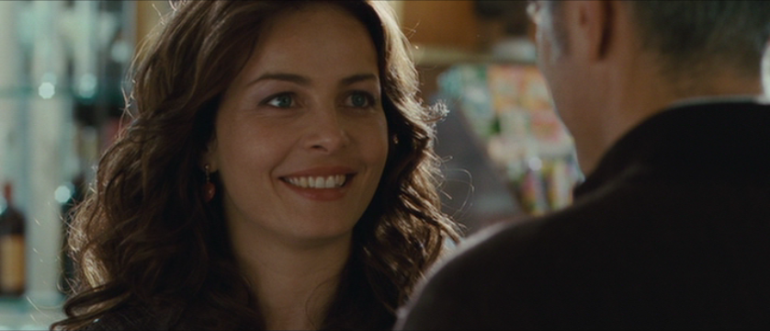Home Movies:
Mathilde and Clara, in Anton Corbijn’s The American
One of my favorite movies from last year was Anton Corbijn’s The American, starring George Clooney and a lot of Italian scenery reminiscent of the Spanish locations used by Sergio Leone in his famous Spaghetti Westerns. Who knew? I thought that The American was an update of the classic European “existentialist” anti-drama of the 1960s, full of brooding silence, unexplained plot points, and disaffected fatalism. It turns out that Corbijn was updating the classic European Western of the 1960s, full of — well, I guess it comes to the same thing. The director tells us, in the running commentary that accompanies the DVD, that he wanted to call the film “Il Americano,” which, he notes, is incorrect Italian — it’s what the American, Jack (George Clooney) calls himself, before a neighbor corrects him (“L’Americano”) All this to highlight the Americanness of an originally British character, drawn from a British novel, Martin Booth’s A Very Private Gentleman.
As you can probably tell, I’ve been on a jag with this film, so it was inevitable that I would listen to the commentary eventually, no matter how bad it was. Corbijn’s commentary isn’t bad, exactly, but it is fairly idle, full of compliments for the actors playing the minor roles and generous lashings of admiration for the big star. One absolutely crucial bit of mystification was cleared up; I’d always thought that it is Pavel (Johan Leysen) who kills Mathilde (Thekla Reuten, shown above). I couldn’t figure out why Pavel did such a thing, but process of elimination ruled out other explanations. What would never have occurred to me, because I’m ignorant about guns, is that Jack sabotages the weapon that Mathilde has commissioned, so that it backfires, killing the shooter instead of the target. Well, it was nice to have that cleared up! But the more Corbijn went on about this and that, the more surprised I was that he had nothing to say about the extraordinary contrast between the film’s two big female roles. Who could be less like Mathilde than Clara (Violante Placido, shown below), the prostitute with whom Jack falls in love?
Indeed, I’m writing this in hopes of banishing Ms Reuten’s image from my mind’s eye, or at least turning down the intensity of her presence. I have never seen an actress radiate the deadly erotic allure that Puccini’s music imputes to Turandot. She captures everything that is dark and dangerous and “European” about The American. Her Mathilde is everything that a man dreads in a woman. Smart and self-possessed, she exudes doubt that the men with whom she has to deal will be up to her mark. In the scene from which I’ve taken Ms Reuten’s image, Mathilde is explaining what kind of a weapon she wants Jack to make. She speaks softly but briskly, like a fairy-tale princess laying down cruel conditions for the hero’s ordeal. Jack’s responses are evidently satisfactory, but it’s obvious that the effort of satisfying her is wearing him down. She actually asks him, “Can you do it?” Later, we will see Mathilde in a knit white dress with a prim turtleneck collar that nevertheless trumpets the physical endowments that it drapes. Mathilde would be a terrible tease, if you imagined for a moment that she gave a damn. She may, in fact, give a damn, but you don’t want to dwell on what that might be like. In any case, you don’t get to see any of her naughty bits.
Clara, on the other hand, is quite often gorgeously naked. The first thing she does, when Jack takes her for a picnic, is pull off her top and beckon him to join her in the stream. Corbijn gives the audience plenty of opportunity to develop an appreciation of the beauty of Ms Placido’s breasts; it might be going too far to claim that they never upstage her, but in any case they do nothing to check our sense that Clara is a genuine ingénue, a girl who has fallen for Jack and who is ready to give him whatever she has. She wants to enjoy him, and she wants him to enjoy her. When she sallies with him, in the scene that I’ve clipped, about meeting for dinner at “the usual place” — the phrase just slipped out of Jack, but of course their regular place is the bordello, so he can’t mean what he said — her expression is warm and playful. There is nothing challenging about Clara, and by the end of the story Jack can’t believe his good luck in finding her. Unfortunately, by then, he’s also dying. Â
In the commentary, Anton Corbijn speaks of Ms Reuten’s wigs. Wigs never crossed my mind, either. I noticed well enough that in the course of her three appearances in the story, Mathilde’s hair goes from ironed-straight to Medusa-permed, with a wavy intermediate coiffure for her knit-dress scene that is at ironic odds with her mission at the moment, which is testing a rifle in a deserted field. (In that episode, she arrives and departs on a sad little train that her presence makes sinister into the bargain.) But I didn’t see anything that a good stylist couldn’t arrange. Who needs wigs? The artifice in Mathilde’s character is bone-deep. Â


